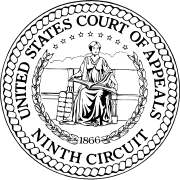United States v. Cotterman
| United States v. Cotterman | |
|---|---|
 |
|
| Court | United States Court of Appeals for the Ninth Circuit |
| Decided | March 8, 2013 |
| Citation(s) | Docket No. 09-10139 |
| Case history | |
| Prior action(s) | |
| Appealed to | Supreme Court of the United States |
| Case opinions | |
| Reasonable suspicion is required to subject a computer seized at the border to forensic examination. | |
| Court membership | |
| Judge(s) sitting | Kozinski, C.J, Thomas, McKeown, Wardlaw, Fisher, Gould, Clifton, Callahan, Smith Jr., Murguia, Christen, Cir. Js. |
| Keywords | |
| Border search exception Fourth Amendment Motion to suppress Reasonable suspicion Search and seizure | |
United States v. Cotterman, (9th Cir. en banc 2013), is a United States court case in which the United States Court of Appeals for the Ninth Circuit held that property, such as a laptop and other electronic storage devices, presented for inspection when entering the United States at the border may not be subject to forensic examination without a reason for suspicion, a holding that weakened the border search exception of the Fourth Amendment to the United States Constitution.
On April 6, 2007 at approximately 10 AM, Howard and Maureen Cotterman drove from Mexico to the Lukeville Port of Entry (POE). Upon arrival, the inspector checked the U.S. Customs and Border Protection electronic database and found a computer-generated alert, based upon Howard Cotterman's prior conviction for child sex crimes in 1992. The alert advised the inspector to be on the lookout for child pornography and due to the warning, the Cottermans were sent to a secondary inspection area.
During the vehicle search, two CBP officers discovered two laptops and three digital cameras. The officers were unable to find any contraband, but did discover a number of password protected files. During this time, the ICE case was assigned to Agent Riley, who then drove with her supervisor Agent Brisbane from Sells, Arizona to Lukeville. During the drive, the two agents decided that they would detain the laptops for forensic examination.
...
Wikipedia
